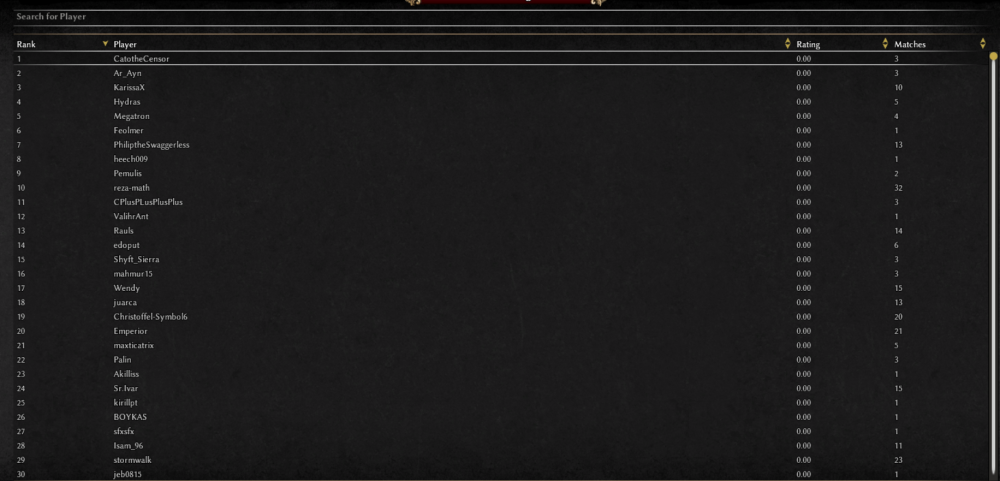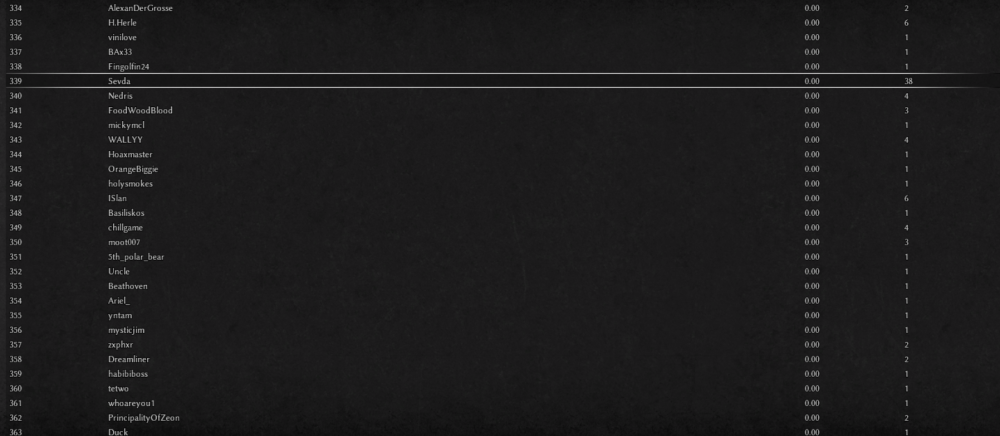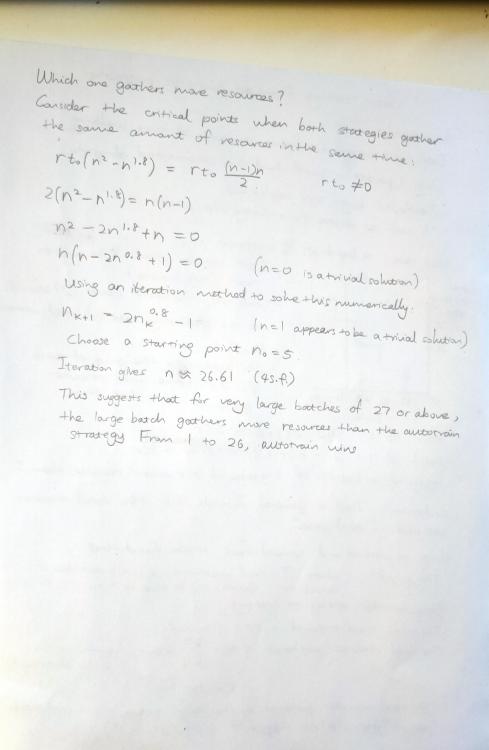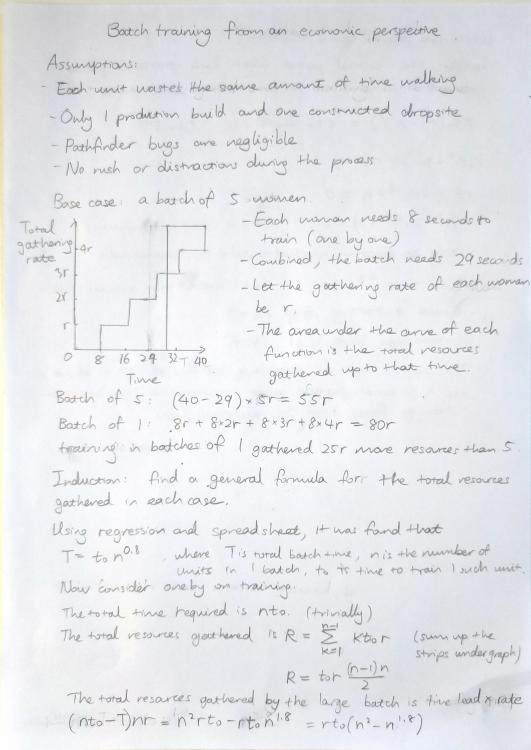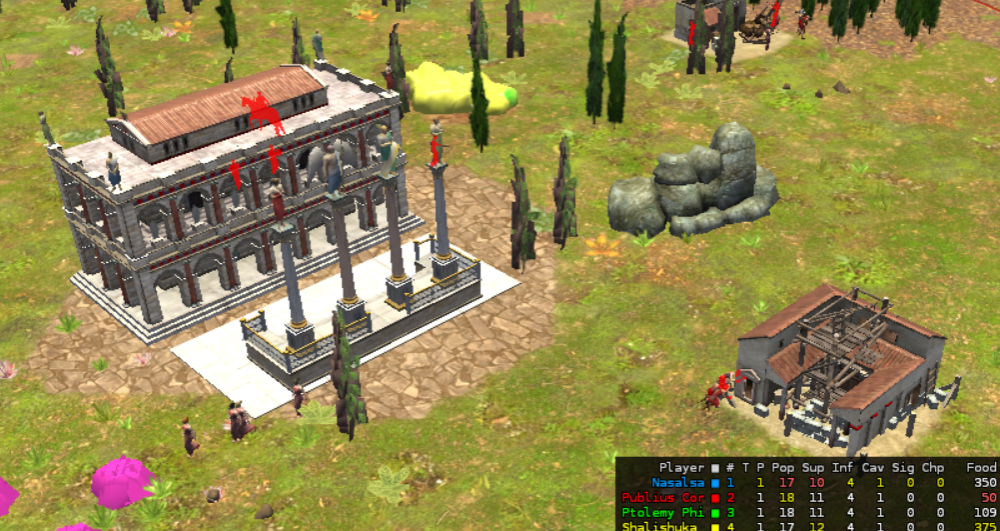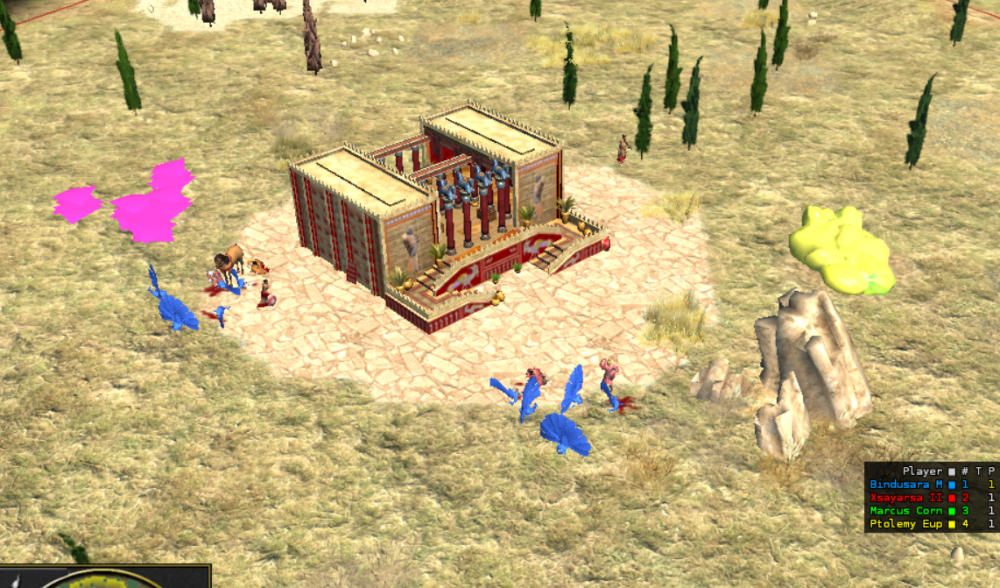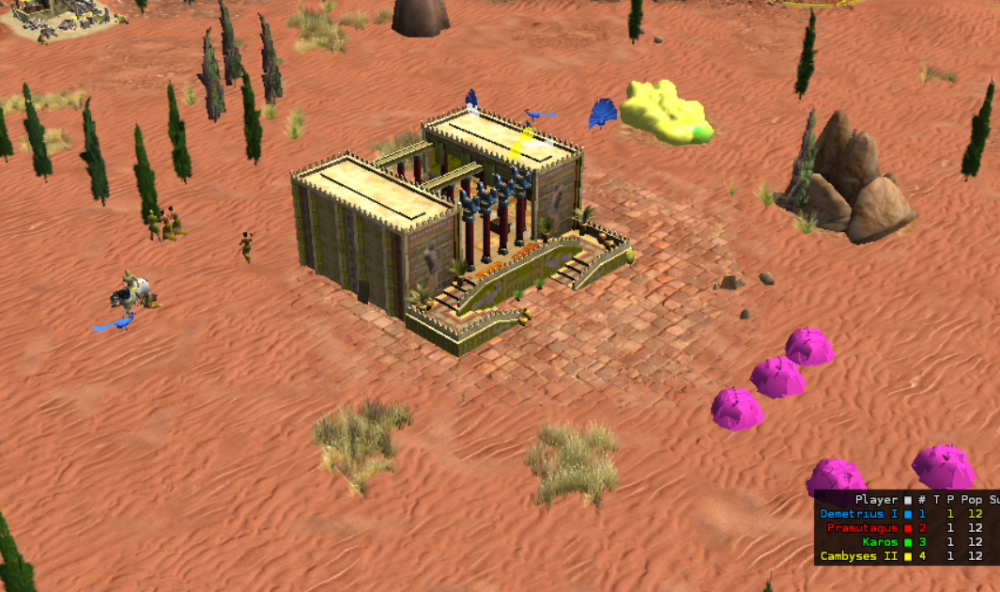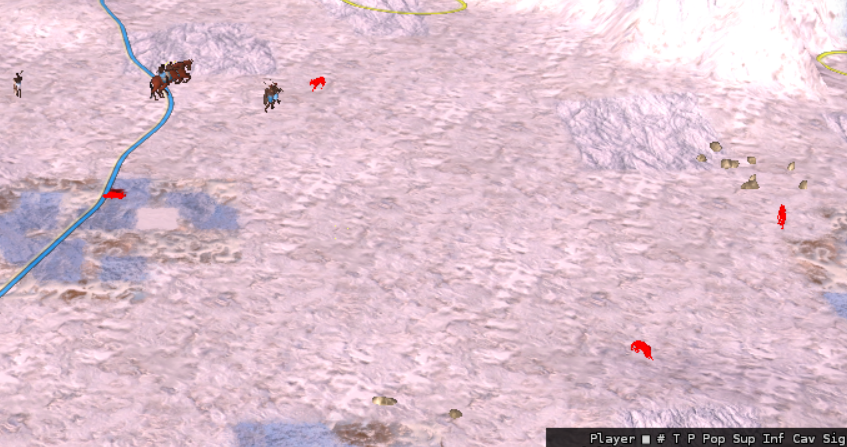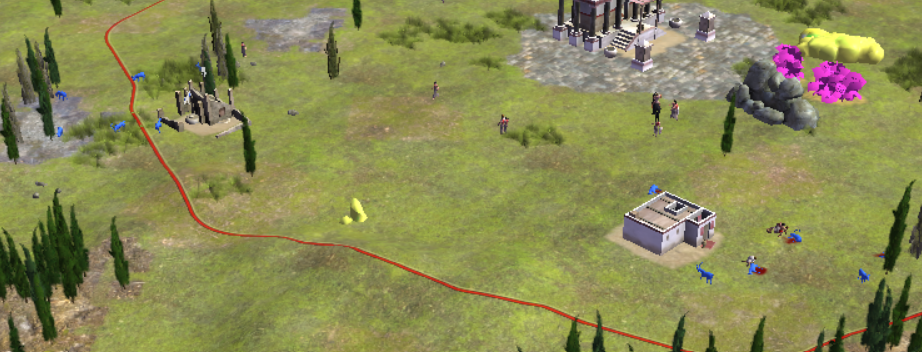-
Posts
2.919 -
Joined
-
Last visited
-
Days Won
50
Everything posted by Yekaterina
-

[Document] The core problems of 0AD and mitigation solutions
Yekaterina replied to Yekaterina's topic in General Discussion
Good advice, thanks I think the author's logic is sound, however, it contradicts with the majority of 0AD's current meta, which has caused discontent among lobby players so it seems. P.S. I have been asked many times where you are, even though you don't play this game anymore. Seems like people miss you a lot. I have switched back to singleplayer A23, the download link is here if anyone still feels reminiscent of A23: https://releases.wildfiregames.com/ -

[Document] The core problems of 0AD and mitigation solutions
Yekaterina replied to Yekaterina's topic in General Discussion
@Sevda Stop wasting time on 0ad and revise The full translation of AIEND's file is here I didn't read what's inside the document and I don't have any idea what you guys are talking about. I will check out A26 when it releases, otherwise I'm gone, and I don't care how you guys balance it because perfect balance is simply not possible with real humans behind the keyboard and 13 different civs. []=========================================================================================================================[] The core problem of 0AD is that some basic settings are in a half-assed state, which affects the overall improvement of various aspects, such as citizen soldiers, frontiers, stages, and heroes. I. Citizen Soldiers The original purpose of adding citizen soldiers was to merge most of the labor units and combat units in RTS into one category, simplifying the player's operation. However, it was not successful in the actual setup, and eventually gave birth to three types of laborers, namely women, citizen infantry, and citizen cavalry, plus builders like hired infantry, and even hired cavalry and champions and heroes who could not labor, which in turn made the original simple and easy to understand labor/combat unit dichotomy replaced by a more complicated and troublesome distinction system. At the same time, since 0AD is a game based on historical facts, and the citizen-soldier setting has a reliance on the premise that the basic soldier tree is common and consistent across factions, but this is not possible in the game. For example, some factions have archers and some don't, and the game is forced to make archers and javelin throwers equal in cost and weaken archer stats in order to maintain faction balance, resulting in subsequent games that add countries that have historically had higher military technology and only have bow-like archers will tend to be weaker in faction balance (e.g. Han and Xiongnu, Serbian species), whereas in a labor/combat dichotomy game, you only need to give archers higher skill requirements and higher costs to balance. In addition, in order to keep the types of resources needed to develop the economy less complex, citizen soldiers cost mostly food and wood, which not only makes it unfeasible to distinguish different classes of units of the same level by relatively scarce metal resources in other RTS (units such as javelinmen and gunners in Age of Empires that consume only wood and food are distinguished from swordsmen, archers and knights that consume metal with food or wood) This even leads to idle metal resources, as citizen soldiers do not conflict with mercenaries, and mercenaries that only need metal even become "cheaper" and become a balance breaker. The high demand for wood also leads to interruptions in town building and citizen soldier training, and the scarcity of wood has been particularly troubling for players in the past on maps that were poorly designed and scattered with trees. The current state of citizen soldiers, which affects the historical adjustment of soldier data and makes labor units complicated and resources spent singularly, is very costly, so with reference to games like Age of Empires and Age of Mythology, I think the following adjustments should be made. 1. add only the cost of food male and female civilians, can be the most efficient to complete the collection of various materials and engineering construction, with civilians to replace the opening given soldiers. 2. Adjust all infantry (except heroes) to "frontline builders", which can cut wood and build military facilities and even siege machines, and the labor efficiency will not be negatively correlated with combat experience. 3. Adjust all infantry and cavalry (except heroes) to "amateur hunters", who can hunt but can collect meat no more efficiently than civilians, and whose labor efficiency is not negatively correlated with combat experience. 4. Change the cost of citizen gunners, sword and shield players, lancers, archers and cavalrymen to food and metal, each with a different ratio of high to low. II. Frontiers The rise of countries with the same frontier concept, whose resources are non-consumable, requires players to control more resource points to achieve by limiting efficiency, so players need to keep expanding new towns to control more ground to improve collection efficiency and also increase depth, in the process, the cost of building new towns is also relatively low. The cost of building a new town in 0AD is unusually high, requiring 500 wood & metal & stone, a total of 1500, far more than the Office of the Age of Empires, Age of Mythology and Rise of Nations, resulting in a rare player building a second Office in multiplayer games. As a result, it is difficult for players to expand their towns to spread out their economic and military facilities and also to spread out their risks, and to build deep lines of defense to hinder enemy attacks, and they can only build the opening town and the only town as a "super city-state" and rely entirely on the army to protect it. Once the town is destroyed or lost, the player will never be able to return, as it will be difficult to rebuild the economy elsewhere, nor to rebuild the military and defense facilities quickly. Therefore, to solve the problems caused by frontiers, a decentralized idea is needed to improve them. 1. lower the cost of the Office and the colony, limit it to 600 and 400 resources (400 wood + 200 stone and 250 wood + 150 stone are recommended), not train soldiers, as a building that simply trains civilians and recycles supplies, reduce HP, attack and frontier influence, and no longer consider it as a fortress-type defense facility. 2. Granary and depot buildings for gathering natural resources such as beasts, berries, wood and metals, and stones should be able to be built in neutral areas as well as docks. This will first effectively use the rich food sources on the map, without having to bother to start farming in the opening game, and will also facilitate a more decentralized placement of mineral resources on the map, avoiding the collection of one or two rich mines to become close to a de facto "infinite". 3. Arrow towers, forts and walls for security and defense should be built in neutral areas, with forts maintaining a certain frontier area of influence. This way, players can block the passages between mountains and forests with few stones through the walls, avoiding the embarrassment of "surrounding one's town with a large circle of walls", and also weakening the role of carts and cavalry and increasing the role of stone throwers. It is also possible to build a "fortress zone" with well-defended and military training facilities, which can be attacked and defended, to improve the role of the fortress, so that the situation does not fluctuate greatly with the army fighting downwind & upwind. 4. Military facilities and temples, which are theoretically occupied, will not get out of control due to the loss of offices and forts, avoiding speculative tactics caused by "office decapitation". 5. Significantly weaken the occupation efficiency of soldiers, especially the cavalry should be less efficient than the infantry. III. Phase Due to the presence of citizen-soldiers, 0AD combines labor and soldier training together with the economic start-up-reconnaissance phase and the economic maturity-readiness phase. This results in a situation where 0AD does not have P1 in the usual sense (instead of P4 as some people think), but rather advances the next three phases, putting the content of P2 in other games at the beginning, where players start with melee infantry, archers and cavalry and most of the military training facilities, and compete from the beginning to develop the economy to maturity and readiness for war. Due to the aforementioned problems with civic soldiers, players' post-opening work is very complicated, and it is even more difficult for new players to master the skills of operation, so many players complain that they have been left far behind by veteran players in the process of P1 to P2 (actually P2 to P3), and therefore have to choose to start the war in P1 (actually P2) to have some possibility of victory (and also the only game experience). And as a rule, the work that players should do after the opening is relatively simple, there should not be too heavy work, should not allow players with different experience to be able to pull too big a gap between them through the operation, the game should be a process that gradually makes players tense up with the stage, not very tense at the beginning. It is because of the lack of P1 in the usual sense that the pace of the game is not only overwhelming for new players who are new to this type of RTS game, but also tricky for those who are used to other RTS such as Age of Empires - they can't touch 0AD, which hinders us from promoting 0AD and thus expanding the player base, so in this regard, we have to adjust the stage in terms of game pacing. 1. Set P1 as the economic start - scouting stage, this stage can only train civilians and scouting cavalry (to replace the original melee or long-range cavalry given in the opening), no longer able to build barracks, stables, arrows and soldiers, players can collect food from beasts and berries faster, and the resources needed to train civilians will not conflict with building construction, upgrading from this stage to P2 only requires food Cost, 600~800 food is recommended. 2. P2 is the stage of economic maturity and expansion, during this period you can build military facilities and train soldiers, and also build primary siege machines, such as punching cars and prowlers and both can be cheaper (prowlers can only attack buildings and machines with rockets), players will start attacking and defending at this stage and completely defeat other players, upgrading from this stage to P3 requires food and metal costs, suggesting 1200 food + 800 metal. 800 metal. 3. P3 is the stage where the battle is white hot, when players can use all their offensive and defensive means to fight fiercely against each other on a map that is already close to being divided up. 4. P4? After P1 has been properly set up, P4 will be worthy of serious consideration as a valuable late stage. This stage should not be set up just for the sake of being set up, and should not just move some of the original P3 content here, or extend some of the already long enough tech lines by another level (e.g. economy and shield tech). Instead, it should provide, for example, population cap increase, upgrade and direct training of advanced citizen soldiers, faster training of stronger champions, strengthening of siege machinery and defense facilities and navy, increase of trade efficiency, and other technologies (some of which should be gains that come with P4), with a suggested upgrade cost of 1500 food + 1000 metal. IV. Heroes The game's view of heroes is more akin to an RPG perspective, these people themselves become "super soldiers" who provide some limited range of aura, even though most of the heroes are actually the historical kings of the various factions, but in the game is reflected more of a warrior and front-line generals, rather than generally give them and leader status macro-global gains that match their leadership status. Ironically, however, this type of global gain is given to the same monarchs of all nations as if the king had no policy accomplishments while he was alive and only had some kind of spiritual power to bless the player when he died. The design of the hero itself is far from being tapped for its design potential than adding an unexplained hearse, or deciding the faction gain by choosing the leader at the beginning of the game (if these appear in the game, there should not be a hero that can directly come on the field), at least the following changes can be made. 1. the heroes including cost attack and defense and other basic data to keep the same as similar champions, so that they return to ordinary people, can be trained in the Office, and the player can repeatedly train them (after death or rather wounded retirement, you can train the same hero again and can not train other heroes). 2. Each hero has at least one global gain, now used on the hearse gain can be referred to (DE module in the opening selection of the leader gain can also be referred to), but also should distinguish the heroes into front-line heroes that favor a small aura to improve the combat effectiveness of soldiers, in the policy heroes that favor global gain, and even a comprehensive hero that has both. Different factions can favor having more of a certain type of hero according to faction characteristics, and choosing a hero also means choosing a fixed tactical route. Translated with www.DeepL.com/Translator (free version) -

[Document] The core problems of 0AD and mitigation solutions
Yekaterina replied to Yekaterina's topic in General Discussion
He has played many RTS games before and his expert analysis of 0ad did impress me. I myself am not a RTS expert so I don't know how knowledgeable he is compared to others on the forum. -

[Document] The core problems of 0AD and mitigation solutions
Yekaterina replied to Yekaterina's topic in General Discussion
Everyone calm down! I was doing the translation, these are not my opinions, I am simply acting as an upgraded Google Translate Pro VIP++ Of course, there might be imperfections in my translations. I also must add that I have never played AoE or AoM before; the closest thing to an RTS was Ice age village and maybe PVZ2. -

[Document] The core problems of 0AD and mitigation solutions
Yekaterina replied to Yekaterina's topic in General Discussion
Part 1: The core problem of 0AD is that the fundamental settings (designs) are incomplete, which hinders our ability to make improvements, for example, citizen-soldiers, territory, phases and heroes. 1. Citizen-Soldiers The original intention of adding citizen-soldiers was to combine worker units and soldier units of most RTS games into 1 category, in order to simplify the gameplay. However, this was not successful in practice. Eventually, we gave birth to 3 categories of workers: women, citizen infantry and citizen cavalry, on top of mercenaries who function as builders. Aside from them are the champions, mercenary cavalry and heroes, who cannot work. The division into these categories not only didn’t simplify the matter but replaced the 2 unit types with a much more complicated unit categorisation system, defying the purpose. At the same time, 0AD aims to be historically accurate, but the design of citizen soldiers juxtaposes with the aim because it relies on the principle that all civilisations have similar basic unit trees and identical stats, for balance. For example, some civs have archers while others don’t. In order to balance the civs, archers are javelineers cost identical amounts of resources and archers had their attack stats weakened to a historically inaccurate extent just to compensate for the javlineers’ range disadvantage. This results in later-added archer civs (e.g. Han, Scythians, Kushites) being placed at a disadvantage in military, even though historically they were quite advanced in military and technology. On the contrary, in a RTS with a clear division between workers and soldiers, all you needed to do was to give archers a higher skill requirement and more resource cost to balance. Aside from this, in order to not overcomplicate the units required to boom your eco, citizen soldiers cost mostly wood and food, which not only banished the classification of units based on demands for rare metal prevalent in other RTS games (in AoE, javlineers and spearmen who cost only food and wood are separate from their swordsman and cavalry units which cost metal), but also resulted in players floating spare metal. Since citizen soldiers and structures do not conflict with mercenaries in resource requirement, mercenaries which only cost metal become ‘cheap’, resulting in them destroying the balance. The immense demand for wood to build cities do conflict with the training of citizen soldiers. On low wood maps designed in the past, this troubles players without mercenary units (making Carth, Maury, Ptol OP on these maps). The status quo of citizen-soldiers not only hinders the adjustments of stats based on historical facts, but also amplified the complexity of worker units and monopolised the demand for wood and food, which is not worthwhile. Therefore, refering to AoE, AoM, etc, I think we should make the following adjustments: 1. Adding civilians of both genders that only cost food. They have the highest efficiency at collecting resources and building structures. Use civilians to replace starting infantry. 2. Adjust all infantry except for heroes to become ‘frontline builders’, such that they can chop wood and build military facilities including siege engines. The efficiency of working is independent from their military rank. 3. All cavalry and infantry (except heroes) are ‘part time hunters’; they can gather hunt at a similar rate as civilians. 4. Citizen spearman, swordsman, pikeman, archer and cavalry cost different amounts of food and metal, only. Javlins and slingers who don’t need metal are defined as ‘trash units’ -
@AIEND Has put much effort into typing up a document that outlines the fundamental problems of 0AD so far and solutions to fix them. Being an expert RTS player who has played a large variety of RTS games, his opinions will certainly be worth considering. The origininal document was typed in Chinese and I will translate it here. I believe this might provide a solution to the endless balancing discussions and new balancing issues the crop up every alpha. Orginal document: 0AD修正[352].docx
-
The game engine doesn not affect the stats, and even if it does affect the gameplay at all, everyone is affected by the change, therefore it causes no balancing issues and hence shouldn't be a problem for multiplayers. I am suggesting dividing up the public mod into 2 to solve all arguments between devs and balancing advisors. Quoting @MarcusAureliu#s:
-
I propose a solution to this problem: separate multiplayer mode and singleplayer mode. We can allow 2 main mods instead of 1: 0ad-relaxed and 0ad-hardcore. For people who want to enjoy relaxed games, good graphics and new features, they can activate the 0ad-relaxed mod. This should also be the default option as it is friendly to newcomers. Within this, the developers can add whatever cool features they want and no-one will ever complain! The developers should commit all of their new features to this mod. This will prevent lobby players who complain about balancing issues from hindering the development of the game. For hardcore lobby players who want stagnant features for balance, they should activate 0ad-hardcore mod, which focuses much more on balancing at the cost of new features and art. Within this, I would recommend implementing Feldmap, vividcolours and autociv by default (I cannot play without these nowadays). We can even have different pathfinders and AIs within this! Changes should not be made to 0ad-hardcore unless there is a concensus across the competitive playerbase. This would also eliminate the problem of inexperienced players ruining TGs: they are unlikely to know how to activate mods nor would they actively try to, so there is a natural filter for hosts. By the time someone is willing to activate the mod and use it regularly, they are likely qualified for TGs. The two mods should be updated separately each alpha. Furthermore, we can make mods to fix imbalances and convince other players to install our mods. Again, this removes inexperienced players from pro games without hurting their feelings. @Stan` Does my idea sound reasonable? After playing this game for 2 years as both AI player and lobby player, I think splitting the 2 groups is the easiest solution. It is certainly acheivable from a technical point of view.
-
No matter how hard the developers try to balance, mistakes by the host (bad team settings and randomness) will cause imbalances. If there is a random civ option and some people got a civ that they don't like, it will be imbalanced, as a supposedly 1700 player might perform like a 1400. Furthermore, some civs naturally perform better in certain terrains or against other civs. If you don't use feldmap, one team might get all the resources and the other team doesn't. At the moment, the biggest source of imbalance is randomness, not really new features from the developers. Unless we change the very foundational mechanics of the game, I think A25 is the closest we have come so far and the developer team has done a good job at balancing the civs ( with the exception of fire cav and mercenary sword cav) Solutions 1. Let players choose what they want. If they think that the Ptolemies are OP, then by all means let them take it. If you think that Carthaginians or Iberians are OP, take those. 2. Never random biome or random map 3. Implement feldmap into vanilla, or at least convince all TG players to install it ( A good way to filter inexperienced players from your game, as new players don't know how to install feldmap). 4. Give genuine balancing advices when making teams. Don't try to troll the host just because they don't know some of the players there. 5. Agree before the game which units are banned, and just don't make them. If all you want is to win, then just go beat up the Petra Bot and don't play TGs. Perfect balance will be boring; it can only be achieved if everyone is doing the same thing with exactly identical spawns.
-

mod LocalRatings mod - evaluate players' skills based on previous games
Yekaterina replied to Mentula's topic in Game Modification
@Mentula using your default settings, this is the leaderboard for me: And I find myself with no rating Why is it that so many players have a score of 0? -

mod LocalRatings mod - evaluate players' skills based on previous games
Yekaterina replied to Mentula's topic in Game Modification
Furthermore, you can farm ratings easily using virtual machines (although I haven't been able to work out the maths behind the rating system), so I am inclined to trust Mentula's ratings mod more than Vanilla Lobby's ratings evaluation. -
<Group> Code for your variations </Group>
-

Resistance calculations
Yekaterina replied to maroder's topic in Game Development & Technical Discussion
We are the Borg, lower your shields and surrender. You will be assimilated. Your biological and technological distinctiveness will be added to our own. Your culture will adapt to serve us. Resistance is futile. Fire damage has no armour to counter so we need fire armour. -

mod LocalRatings mod - evaluate players' skills based on previous games
Yekaterina replied to Mentula's topic in Game Modification
@Mentula I would recommend adding an uncertainty label after the main rating, calculated based on how many games they have played with you. This will prevent players with just 1 fluked match getting ridiculously high ratings. For example, leGrosRobert is at the first place although he is arguably not the best player in your list. Furthermore, 2 of Yekaterina's smurf accounts are way better than you and weirdJokes, although I doubt whether she is actually that talented. -

Batch Training (The Good, The Bad and The Ugly)
Yekaterina replied to Micfild's topic in Gameplay Discussion
I would like to conclude at the following: If you are new to the game and struggle with booming up to the standard of 200 pop in 12 minutes, then autotrain is for you. It will save you much hassle in selecting the right batch sizes and makes you more flexible (especially when a rush happens). Pro players, carry on and do your thing. Maths can never take care of all the surprises and varied strategies that you might be playing into. -

Batch Training (The Good, The Bad and The Ugly)
Yekaterina replied to Micfild's topic in Gameplay Discussion
That is one thing that I forgot to consider. However, I really doubt whether anyone can sustain production sizes of 27... It is the most suitable strategy for post war regeneration, if you are floating resources. You are left with 2 or 3 barracks, each producing 27. This will boost you from 100 pop back up to 181 in just 2 minutes and 20 seconds, allowing you to fight again. -

Batch Training (The Good, The Bad and The Ugly)
Yekaterina replied to Micfild's topic in Gameplay Discussion
-
To continue this guide, I would like to offer some of my insights on how to fight effectively and I believe that videos are the most efficient way to convey this. First of all, a basic guide to using formations and attack move (ctrl + right click) https://www.youtube.com/watch?v=KArfG2a_mMY Secondly, although controversial, dancing will save you in desperate situations. Here are 3 dance moves (more are coming, stay tuned): Ranged cavalry dance: https://www.youtube.com/watch?v=YX_bX-_pQsc Pikeman dance: https://www.youtube.com/watch?v=M2KXXgtW8Vo Hero dance: https://www.youtube.com/watch?v=x3FwGsE5PbM Finally, Yekaterina's large batch size build orders focus on pushing out the maximum number of units in early game. On the other hand, I have a build order using autotrain that will maximise your economy and catch up with her population at minute 11 (if done correctly). It also enables you to research technologies earlier and progress through the phases faster. I also think that autotrain is easier than her technique, especially for new players. https://www.youtube.com/watch?v=N86b1beBy6g&t=948s Smaller batch size negates the batch training bonus, however, workers begin their task much earlier than they would do in a batch train, so the total resources gathered will be greater. These additional resources can then be invested in technologies and more barracks for faster unit production. Another side bonus is improved rush defence: if you train in large batches and a group of cavalry raid you in the meantime, all of your units would be dead when your soldiers emerge from barracks. Whereas, if you use small batches, not only can you afford soldiers much earlier, but also have a decent number of them ready before the enemy cavalry arrive, which means you can put up a decent fight and scare the cavalry away.
-

suggestions Thread for posting suggestions for Alpha 27.
Yekaterina replied to Lion.Kanzen's topic in General Discussion
Not necessarily. Many players build their elephant stable very close to the front line, so it is easy for you to distract the enemy then send a team of cavalry to capture it. They are easy to capture. I have done it many times in team games and none of the human players could react and delete their elephant stable in time. I do agree that it's difficult to get your hands on one, but I think Romans producing native elephants is neither historically accurate nor good for balance. If I remember correctly, in A24, some people suggested a mercenary building for the Romans to recruit a more diverse range of troops. That might be useful, but we need to discuss this with the balaning advisors. -

suggestions Thread for posting suggestions for Alpha 27.
Yekaterina replied to Lion.Kanzen's topic in General Discussion
My recommendation is let Romans train elephant from captured elephant stables. This makes sense from a historical point of view, and makes gameplay more interesting for the Romans (reminds me of Britons capturing catapults in A23). In order to achieve this, copy an elephant template into the Roman units folder but don't add the structure. -
@soloooy0 perhaps try deleting all of your logs and configs, restart the PC and try again? If not, then wipe all 0ad related directories completely and reinstall the game?





